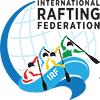During the 2015 World Rafting Championships on the Citarik River in Indonesia, Rafael Gallo, one of the founders of the IRF and former IRF President, included time during the event for competitors and volunteers to plant trees.
This action also planted a seed in Amalia Yunita (Yuni), Acting Chairperson of the Indonesian Rafting Federation. This seed is continuing to grow into a program to integrate sustainable practices as a part of rafting competitions in Indonesia, establishing a model for how this could be done in future rafting and other sporting events around the World.
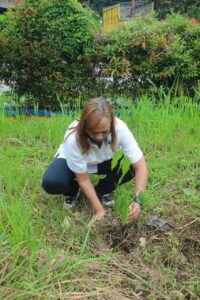 If you haven’t met her, Yuni is a force of nature, one of those unique individuals destined to be a “change-maker.” Yuni started rafting in 1987 while attending University in the U.S., on rivers in California, Oregon, and Idaho. She worked as a raft guide in Indonesia in 1994 before starting her first adventure travel company, Arus Liar, in 1995 and founding another company, Bravo Adventure, in 2014.
If you haven’t met her, Yuni is a force of nature, one of those unique individuals destined to be a “change-maker.” Yuni started rafting in 1987 while attending University in the U.S., on rivers in California, Oregon, and Idaho. She worked as a raft guide in Indonesia in 1994 before starting her first adventure travel company, Arus Liar, in 1995 and founding another company, Bravo Adventure, in 2014.
In addition to serving as Director of both these companies, Yuni established the governing body of Indonesian raft racing (FAJI) in 1996. She is currently the Acting Chairwoman of FAJI and has become an IRF Judge and Judge Assessor. Yuni estimates she has run over 50 rivers in 14 different countries.
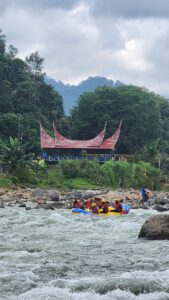 After WRC 2015, rafting competition grew fast in Indonesia, with national championships every year and an IRF World Cup in 2019. Then, the pandemic caused a catastrophic 90% drop in Indonesia’s tourism economy. To bring back sustainable tourism, the Indonesian government developed the CHSE (Clean, Health, Safety, and Environment) certification program. The CHSE certification guarantees tourists and the public that the products and services of participating vendors have met cleanliness, health, safety, and environmental sustainability protocols.
After WRC 2015, rafting competition grew fast in Indonesia, with national championships every year and an IRF World Cup in 2019. Then, the pandemic caused a catastrophic 90% drop in Indonesia’s tourism economy. To bring back sustainable tourism, the Indonesian government developed the CHSE (Clean, Health, Safety, and Environment) certification program. The CHSE certification guarantees tourists and the public that the products and services of participating vendors have met cleanliness, health, safety, and environmental sustainability protocols.
When rafting competitions and commercial rafting operations reopened in Indonesia, Yuni and her colleagues readily embraced the new CHSE program. They began developing practices relevant to rafting tourism and sports competitions.
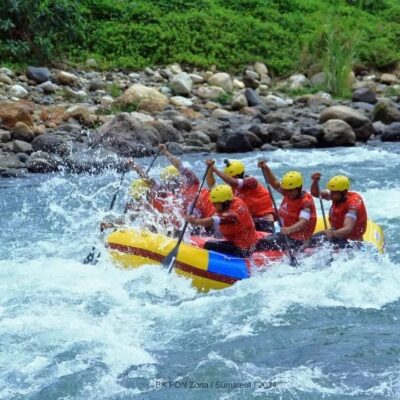 These practices were implemented in 2023 by the Indonesian Rafting Federation (FAJI) during rafting competitions to select the top three teams from each provincial Zone in Indonesia; Zone I for Sumatra Island, Zone II for Java, Bali and Nusa Tenggara Island and Zone III for Kalimantan, Sulawesi, Maluku, and Papua Island. The top three teams from each Zone will participate in the biggest multisport event in Indonesia, National Sports Week 2024 – PON XXI/PON ACEH-SUMUT 2024. This year’s event will debut white-water rafting, which features 65 sports over 12 days, in September 2024 on the Alas River in the Province of Aceh. The rafting competition will include women’s and men’s categories in R4 and R6 for sprint, head to head, slalom, and downriver disciplines.
These practices were implemented in 2023 by the Indonesian Rafting Federation (FAJI) during rafting competitions to select the top three teams from each provincial Zone in Indonesia; Zone I for Sumatra Island, Zone II for Java, Bali and Nusa Tenggara Island and Zone III for Kalimantan, Sulawesi, Maluku, and Papua Island. The top three teams from each Zone will participate in the biggest multisport event in Indonesia, National Sports Week 2024 – PON XXI/PON ACEH-SUMUT 2024. This year’s event will debut white-water rafting, which features 65 sports over 12 days, in September 2024 on the Alas River in the Province of Aceh. The rafting competition will include women’s and men’s categories in R4 and R6 for sprint, head to head, slalom, and downriver disciplines.
The goal of the Indonesian Rafting Federation’s sustainable practices in sports initiative is to create a legacy of positive environmental, social, and economic impacts for the local people. Below are some actions to achieve this goal during the 2023 rafting competitions.
• Local leaders, communities, organizers, and competitors planted trees to balance the carbon footprint during the opening ceremony; each event planted roughly 50 seedlings.
• Encouraged organizers and competitors to collect trash along the river by giving awards to persons and teams who collected the most trash throughout the event, while camping, training, and even before and after races.
 • During event ceremonies and captain meetings, invited all participants to not use single-use plastics, reduce food waste, and conserve electricity and water at their accommodations. This information was also included in a technical handbook that lays out the rules and procedures for rafting events during the 2024 National sports week.
• During event ceremonies and captain meetings, invited all participants to not use single-use plastics, reduce food waste, and conserve electricity and water at their accommodations. This information was also included in a technical handbook that lays out the rules and procedures for rafting events during the 2024 National sports week.• Encouraged all competitors to uphold sportsmanship, playing fairly and cleanly following established IRF race rules and facing victory and defeat with dignity.
• Encouraged teams, judges, and organizers to buy food from locals, pay for logistical support from locals, and stay in local homestays near the river.
Finally, through FAJI and her companies, Yuni has provided opportunities for the children of her staff (managers and guides) to compete in rafting competitions. The daughters competed in the 2022 WRC Bosnia, winning gold in the U23 division, and paddled with determination and skill. Through their accomplishments in competition, FAJI has helped them receive scholarships to pursue education in sports academics. As World Champions, this young team inspired many people in Indonesia, especially the local people around the river where they work and train. If you ask the kids who play and swim in the river about what they want to be when they grow up, many say they want to be athletes.
Yuni admits that building sustainable practices for rafting events is a work in progress. But with each event, FAJI learns how to improve its practices and processes to create a better future for its rivers and communities.
